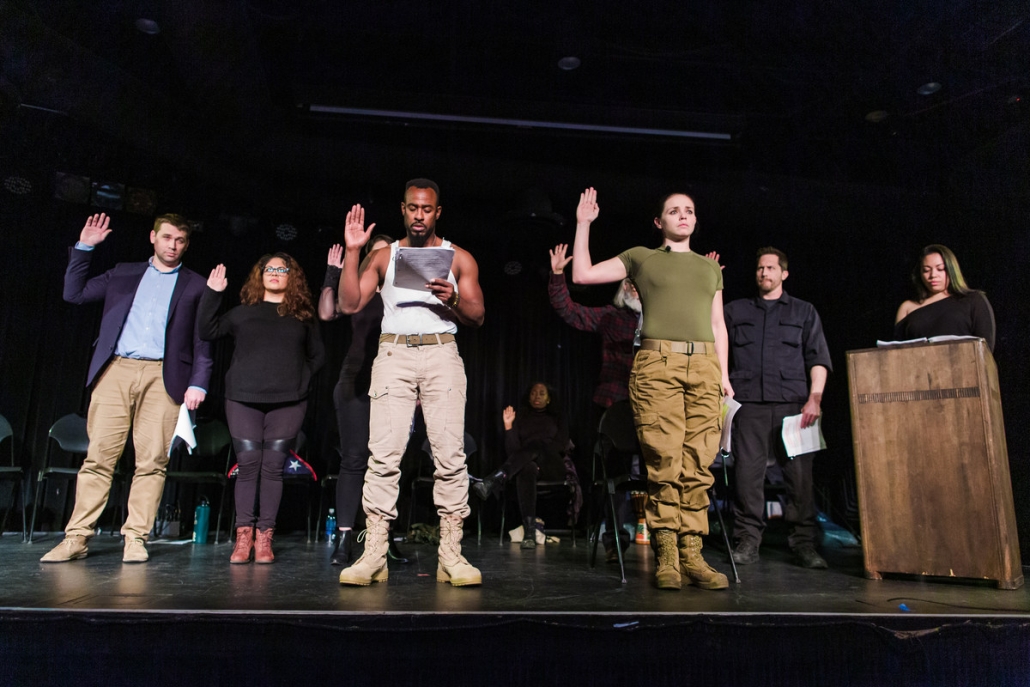Veteran program incorporates Greek tragedy performances

Warrior Bards, which finished its production season last month, takes what its members call a unique. approach to helping veterans reconnect with civilian life. Its unconventional methods of reintegration culminate in performances of Greek tragedies. According to its members, it’s unlike any other veteran program.
Supported by USC’s Arts in Action and Community Partnership programs, Warrior Bards invites 25 veterans to study with faculty from the Department of Classics, the School for Dramatic Arts and Division of Media Arts + Practice, giving veterans the opportunity to speak on their experiences in combat and the hardships they currently face.
With roots in the Warrior Chorus program — a program that aims to connect veterans to ancient tragedies by studying literature — Warrior Bards similarly allows veterans to express themselves through a performance of Greek tragedies to a live audience of veterans and non-veterans, according to William Thalmann, a professor of classics in the Dornsife College of Letters, Arts and Sciences.
“[The purpose] is really to give the veterans a way of thinking and talking about their experiences through the medium of something distant and ancient that still speaks to them,” Thalmann said. “Public performances … will be driven for veterans in the audience, but it will also help non-veterans understand what it’s like to have been at war and coming home. It helps bridge that gulf between the veteran and nonveteran community.”
Thalmann said the veterans interpreted the classical texts in ways that he hadn’t considered, helping him understand the struggles they had experienced.
“I’ve studied Greek tragedy for many years, but I found that these veterans were finding things in text that I haven’t even been aware of just because of the experiences they were bringing to the plate,” Thalmann said. “The whole experience of working with these people has made me very aware of what it’s like [for veterans] and as a society that really has not been very welcoming [to] them.”
Megan Mosley, a member of the program, said that Warrior Bards is unique in allowing veterans to share their perspectives with civilians without feeling ostracized.
“Sometimes that can be quite isolating for veterans to be … the poster child for how to be a good U.S. citizen, but we’re never actually heard,” Mosley said. “[Warrior Bards] was one of the few times where I think I’ve actually got to talk about my veteran experience to a civilian audience and to talk about these very deep, very raw experiences in a way that it wasn’t like I was being unpatriotic.”
Warrior Bards representative Nathan Graeser said the historical intention of these tragedies was to help soldiers openly express their struggles of war through performance. The program maintains its original purpose: to help veterans navigate their combat experiences and relay them in a contemporary context.
“Most of the time we just say ‘thanks for your service’ and move on,” Graeser said. “And these plays don’t do that — they really sort of gauge the deeper moral issues … What does it mean when you lose people, and you don’t know how to talk about that? Or we all had friends who never made it back home. You realize that your story is not really your story. It’s a story that’s been told before you and a story that will probably be told again.”
Mosley also said the importance of having a female faculty member in Bards — Paula Cizmar, an associate professor from the School of Dramatic Arts — was crucial to the program and resonated with her struggles in a male-dominated environment.
“She is technically in a position of authority, and she’s a leader most importantly, whether she realizes it or not,” Mosley said. “As somebody who has kind of needed that guidance because I’ve mostly been in male-dominated industries … to be represented was incredibly important.”
Nicholas Cormier III, a veteran who previously struggled with homelessness while in the program, said it was motivating to visit the University each day. By resonating with the literature, he was able to overcome his personal obstacles.
“[Warrior Bards is] not set up to be therapy … my interpretation was … that I get to engage with [literature] that has always resonated with me,” Cormier said. “The main takeaway from me was that I’m not alone. [I’m] with people who really wanted to be there … and also be passionate about what we’re doing.”

